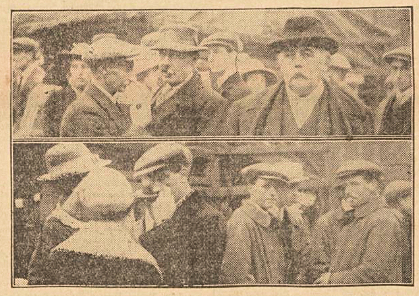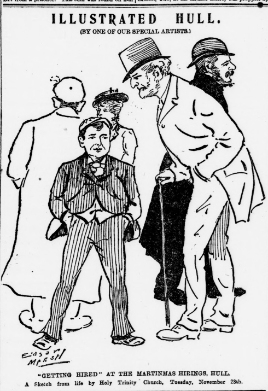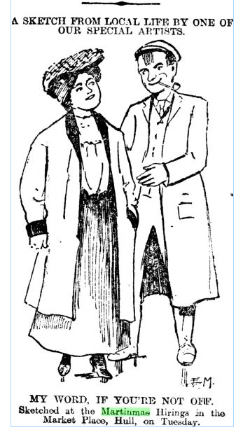|
Martinmas Hiring Fairs in Hull, 1880-1950
Stephen Caunce
 A century ago, most single East Yorkshire lads and girls were hired to live in on farms, either looked after by the wife of the farmer or, on large farms, of a hind, or foreman, and they worked six days a week. They started out as young as twelve, being hired thereafter for a year at a time, less a week off between contracts. Therefore, 'every young man and maiden … looks forward to the 23rd of November as the day of deliverance when they will shake off the trammels of servitude and breathe the air of freedom. For seven days they will be able to come in and go out without let or hindrance, and in all things follow their own sweet will. They gather in great numbers at the hiring fairs in the market towns where their ancestors for generations have stood. Before the town people had well finished their breakfast … the main street of the place would be alive with a jovial crowd of roystering lads and lasses in the vigour of youth, in the bloom of health.’ This festival time was called Martinmas, and was often seen as ‘the farmworkers’ Christmas’. A century ago, most single East Yorkshire lads and girls were hired to live in on farms, either looked after by the wife of the farmer or, on large farms, of a hind, or foreman, and they worked six days a week. They started out as young as twelve, being hired thereafter for a year at a time, less a week off between contracts. Therefore, 'every young man and maiden … looks forward to the 23rd of November as the day of deliverance when they will shake off the trammels of servitude and breathe the air of freedom. For seven days they will be able to come in and go out without let or hindrance, and in all things follow their own sweet will. They gather in great numbers at the hiring fairs in the market towns where their ancestors for generations have stood. Before the town people had well finished their breakfast … the main street of the place would be alive with a jovial crowd of roystering lads and lasses in the vigour of youth, in the bloom of health.’ This festival time was called Martinmas, and was often seen as ‘the farmworkers’ Christmas’.
Hull may be a surprising venue as a big city, but it hosted one of the busiest of these ‘statute hiring fairs’, outside Holy Trinity Church and the ‘King Billy’ statue. The Hull Daily Mail provided evidence each year of the impact on the city, and regularly contrasted the country folk favourably with ‘the pale-faced city youths’, though locals mocked them as ‘farmers’ joskins (kneestraps)’. In 1898, the city ‘was besieged from an early hour and vehicular and pedestrian traffic suffered considerably… Farmworkers were landed at the railway stations from various parts of Holderness and Howdenshire but appeared more “on pleasure bent” than inclined for business’, a combination that explains why these fairs were so popular. There was even ‘a large influx of farmers and agricultural labourers from north Lincolnshire’. Ten years later, it said that ‘the Market Place was thronged like a miniature Hull Fair’.
 Martinmas is the religious feast of St Martin, celebrated on November 11th, when the harvest was over and the cycle of traditional farming tasks sank to its lowest ebb. Work was relatively unaffected by a changeover of workers then, and it was a fact of life in farm service that hirelings liked to move at least every couple of years. However, when the government cut eleven days from the calendar in1752 to get back in step with the astronomical year, hiring fairs changed their dates to keep in step with operations, though Yorkshire actually skipped 12 days, making the 23rd into Old Martinmas Day. In the USA,incidentally, Martinmas still remains a huge family-centred festival as Thanksgiving. Martinmas is the religious feast of St Martin, celebrated on November 11th, when the harvest was over and the cycle of traditional farming tasks sank to its lowest ebb. Work was relatively unaffected by a changeover of workers then, and it was a fact of life in farm service that hirelings liked to move at least every couple of years. However, when the government cut eleven days from the calendar in1752 to get back in step with the astronomical year, hiring fairs changed their dates to keep in step with operations, though Yorkshire actually skipped 12 days, making the 23rd into Old Martinmas Day. In the USA,incidentally, Martinmas still remains a huge family-centred festival as Thanksgiving.
In the 1970s I tape recorded people who remembered such events, but quite soon newspapers will be the only window for further research. Down to the 1950s annual reports appeared like this, ‘wage rates of last year were maintained, but a good hand could demand more. The average for foremen was about £28, whilst waggoners received from £20 to £22. Second lads ran from £16 to £17, and plough lads accepted offers averaging from £13 to £15. There did not appear to be a great number of [female] servants seeking “places”. Their demands went from £15 to £18.’
If wages seem absurdly low, the value of their keep did double them for a top man, and made up most of what a youngster got. A government enquiry said that East Yorkshire farm servants were the best fed group in the working-class, and ate better than many middle class people. They bargained fiercely over wages, for some servants got 20% more than others for similar jobs. The state of farming mattered as well, as in 1902, when ‘all farm work is very backward, and that has caused the upward tendency in wages’. In 1909, ‘there never was a time when the wages asked were so high’. Also, the wider economy mattered as well: reports that ‘agents engaged the pick of the men for tramway and rully (horse-drawn lorries) work in Hull and Grimsby, and many farmers are thus seriously inconvenienced’ occur. In fact, until the 1920s, these wages were among the highest in the UK for farm workers, but then the Great Depression hit farming hard and rates fell abruptly. The introduction of minimum wages stopped that, but stifled bargaining, especially as farmers' incomes had also collapsed. Wartime rationing then made life harder for farmers' wives, yet increasingly informal hiring still persisted well into the 1950s.
Their agreed wages were due only when the year ended, and farmers had got some harvest sales completed, and as contracts were legally binding you could neither resign nor be sacked without good cause. Only a magistrate could set aside a contract, which rested solely on a spoken agreement, for farmers could not afford to get a reputation for cheating. Each bargain was sealed by an additional ‘fastening penny’ or ’fest’, paid on the spot. In contrast, married workers were called ‘labourers’, lived in the villages and were paid weekly till one side or the other ended it.
 Lads mostly looked after farm horses, and that not only meant rising at 4 am to feed them but also going back around 8 at night. On large farms, each lad had a place in a hierarchy, with the waggoner or wag, at the top keeping an eye on everyone else, and then second (towards Howden, but no such job existed elsewhere), thirdy, fourthy, and so on. Lads mostly looked after farm horses, and that not only meant rising at 4 am to feed them but also going back around 8 at night. On large farms, each lad had a place in a hierarchy, with the waggoner or wag, at the top keeping an eye on everyone else, and then second (towards Howden, but no such job existed elsewhere), thirdy, fourthy, and so on.
Since servants also came into Hull to have a good time, and they dressed in their best. At Bridlington in 1895, lads wore ‘a light salmon-coloured moleskin jacket with black velvet collar, and a pair of smart corduroys, violet coloured, perhaps, and slit up at the bottoms with rows of pearlies on either side. A bright flower (it may be artificial) in his buttonhole, and his jacket is not buttoned – that would not be correct. The proper fastening is two or three inches of brass chain, to display a capacious chest.’ However, in 1931 it was noted at Hull that they no longer all dressed in such a distinctive way, and old photographs support this.
Martinmas gave the lads and girls both the money and opportunity to buy such clothes, and they also bought presents for parents. Adverts appeared like one encouraging them to ‘visit the Lion Clothing Company’, based at Hessle Road and Cannon Street, to see ‘the “Lion” Overcoats for all sorts of weather and purposes, in fact there’s every style that can be desired’. This included ‘strong print mole coats and vests, with heavy rug linings… all kinds of outfitting of very best qualities at the lowest prices in the world.’’’ In 1887, they were also offered concertinas, accordions, guitars, violins, flutes and banjoes, with the shopkeeper saying he ‘had on hand a large stock of first class goods at the lowest prices’. In 1902, it was reported that a crowd of five hundred gathered round ‘a couple of pitches on vacant land on the Church-side about noon, watching the out-door auctioneers and laying out money. There were groups round hawkers of cheap jewellery, and many displayed spruce looking rings on their fingers.’
Travelling funfairs were an important feature at hiring fairs across northern England. However, not a single report for Hull comments about this, whereas York’s fair stretched across the walled city and lit up the night. Despite the large numbers seeking pleasure, perhaps the October fair was too recent for the big rides and shows to return to Hull? Even so, almost certainly, as at Beverley in 1892, lower key entertainments were present: ‘the showmen and swing-boat men would set up roundabouts, hurdy-gurdies, and stalls.’
It was all the more appreciated because all servants lived isolated lives, and this was a time for serious courting, and a favourite for weddings. However, having pubs open all day ensured that fights broke out, especially to settle old scores. Unless it became a brawl the police generally just looked on – there were not many of them, and this was the hirelings' day. This led to serious criticism by some clergy and their supporters, and in 1914 the Yorkshire Post reported a sermon preached at Carlisle Cathedral saying that ‘this devilish custom is an ungodly thing, this public exhibition of young men and young women in the open streets for hire, with all the concomitant perils of concentrating a horde of young people of both sexes away from home with so much time on their hands and with nothing to do!' Mary Simpson of Carnaby, a prolific letter writer, helped lead local efforts to tame fairs, but most people just enjoyed the day. It did lead to the provision of alternative entertainments as in at George-yard Chapel, Lowgate, opposite the Town Hall, from noon of each day there will be free entertainments continuously – magic lantern exhibitions and vocal and instrumental music. There will also be lavatories and cloak-rooms provided free of charge. The Coffee House Company will provide first-class refreshments at their usual low rates’.
|

